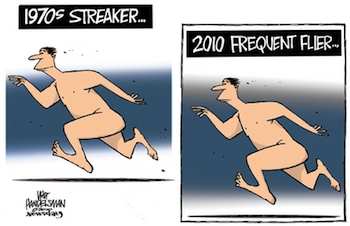- MENU
- HOME
- SEARCH
- WORLD
- MAIN
- AFRICA
- ASIA
- BALKANS
- EUROPE
- LATIN AMERICA
- MIDDLE EAST
- United Kingdom
- United States
- Argentina
- Australia
- Austria
- Benelux
- Brazil
- Canada
- China
- France
- Germany
- Greece
- Hungary
- India
- Indonesia
- Ireland
- Israel
- Italy
- Japan
- Korea
- Mexico
- New Zealand
- Pakistan
- Philippines
- Poland
- Russia
- South Africa
- Spain
- Taiwan
- Turkey
- USA
- BUSINESS
- WEALTH
- STOCKS
- TECH
- HEALTH
- LIFESTYLE
- ENTERTAINMENT
- SPORTS
- RSS
- iHaveNet.com
Matthew Bandyk

Federal government plans to beef up airport security, but that costs more than it might seem
Standing in security lines in airports is very common over the holidays, but the alleged attempted bombing of Northwest Flight 253 on Christmas made Americans think even more about airport security than usual. Many politicians have reacted to the incident by arguing that airport security is not strict enough. Los Angeles Mayor Antonio Villaraigosa called for airports to use full-body scanners more widely. Amsterdam's Schiphol airport has required all passengers boarding flights to the United States to walk through these scanners. Since the Christmas incident, the federal government has planned to spend about $1 billion on new full-body scanners and other security technology such as bomb detectors.
Many Americans see waiting in lines, taking off their shoes, and other security measures as necessary evils. A
The resources spent are large--and bigger than you might think. The money spent on airport security goes far beyond the actual operating budget of the
According to a survey by the consulting service
That extra time spent at the airport has a cost. It means less time to spend at work, less time to spend with children, and less time for leisure. Another survey by the
Greater use of full-body scanners instead of metal detectors would very likely increase wait times and thus raise those costs. Poole says that getting a passenger through a full-body scanner takes about 30 seconds longer than through a metal detector. "If TSA made [full-body scanners] mandatory as a replacement for metal detectors, this would be huge. There would be lines going out the buildings," says Poole.
A full account of the cost of security delays does not end here, however. There are also ripple effects from the delays that create new costs. For example, longer delays at the airport encouraged passengers to seek new modes of transportation for their trips, such as driving. Beefing up security generally makes people feel safer. But long security lines following
But these costs have to be measured against the massive damage that would be done to the economy if another terrorist attack were to occur. The
Poole says there are ways to reduce delays without compromising security. One idea is the creation of a registered travel program. Frequent fliers could undergo extensive background checks and, if they pass, would receive biometric cards that would allow them to pass through a quicker security line at the airport. Think of it as a fast-pass lane at toll road stations.
Travelers might be able to sign up for such a program soon. Erroll Southers, President Obama's nominee for head of the TSA, said in a congressional hearing that he supports the idea of some kind of registered traveler program.
WORLD | AFRICA | ASIA | EUROPE | LATIN AMERICA | MIDDLE EAST | UNITED STATES | ECONOMICS | EDUCATION | ENVIRONMENT | FOREIGN POLICY | POLITICS
What Airport Security Really Costs